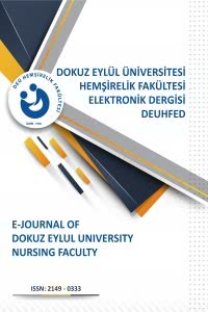Aileden Aileye Destek Programına İlişkin Deneyimler
Şizofreni, aileden aileye destek, deneyim
An Experience Of Implementing The Family to Family Support Program
Schizophrenia, family to family support, experience,
___
- Addington, J., Collins, A., McCleery, A., & Addington, D. (2005). The role of family work in early psychosis. Schizophrenia Research, 79, 77 – 83.
- Baxter, J.D.(2001). The implementation of a family education program by the British Columbia schizophrenia society. The Universiy of Northern British Columbia. ProQuest
- Dissertations and Theses, ProQuest Dissertations and Theses Carter, K.O.G., & Curlee, M. (1999). The educational needs of families of mentally ill adults: the south caroline experience. Psychiatry Services, 50,520-524.
- Chien, W.T., & Norman I. (2003). Educational needs of families caring for Chienese patients with schizophrenia. Journal of Advanced Nursing, 44(5), 490-498.
- Chien, W.T, Thompson, D.R, & Norman, I.(2008). Evaluation of peer-led mutual support group for chinese families of people with schizophrenia. American Journal of Community Psychology, 42, 122-134.
- Chien, W.T.(2008). Effectiveness of psychoeducation and mutual support group program for family caregivers of chinese people with schizophrenia. The Open Nursing Journal,2, 28- 39.
- Doğan, O.(2002). Şizofrenik bozukluklarda psikososyal yaklaşımlar. Anadolu Psikiyatri Dergisi, 3, 240-248.
- Gülseren, L.(2002) Şizofreni ve aile: güçlükler, yükler, duygular, gereksinimler. Türk Psikiyatri Dergisi, 13(2), 143-151.
- Harvey, C., & Hanlon, B.(2013). Family psycho-education for people with schizophrenia and other psychotic disorders and their families. Australian & New Zealand Journal of Psychiatry, 1–57.
- Lucksted, A., Steward, B., & Forbes, C.B.(2008). Benefits and changes for family to family graduates. American Journal of Community Psychology, 42, 154-66.
- Maldonado, G.J., & Urizar, A.C.(2007). Effectiveness of psychoeducational intervention for reducing burden in latin american families of patients with schizophrenia. Quality of Life Research,16,739-747.
- Mead, S.,& Macneil, C.(2006). Peer support:What makes it unique? International Journal of Psychsocial Rehabilitation, 10(2), 29-37.
- Rüsch, N., Angermeyer, M.C., & Corrigan, P.W.(2005). Mental illness stigma: Concepts, consequences, and initiatives to reduce stigma. European Psychiatry, 20(8), 529–539.
- Schenk, P.A, Lippincott, R.C., Bennett, C., & Steigman, P.J.(2008). Improving knowledge about mental illness through family-led education:the journey of hope. Psychiatry Services, 59, 49-56.
- Solomon, P.(2000). Interventions for families of individuals with schizophrenia maximising outcomes for their relatives. Disease Management & Health Outcomes, 8(4),211-221.
- Tan, S.C.H., Yeoh, A.L., Choo, I.B.K., Huang, A.P.H., Ong, S.H., Ismail, H., Ang P.P., & Chan, Y.H.(2012). Burden and coping strategies experienced by caregivers of persons with schizophrenia in the community . Journal of Clinical Nursing, 21, 2410–2418.
- Terschinsky, U.(2000). Living with schizophrenia:the family illness experience. Issues Mental Health Nursing, 21, 387- 396.
- Winefield, H.R., & Harvey, E.J.(1994). Needs of family caregivers in chronic schizophrenia. Schizophrenia Bulletin, 20(3), 557-566.
- Young, R.(2001). Support groups for relatives of people living with a serious mental illness:An overwiew. International Journal of Psychological Rehabilitaion, 5, 56-80.
- ISSN: 2149-0333
- Yayın Aralığı: 4
- Başlangıç: 2008
- Yayıncı: Dokuz Eylül Üniversitesi Hemşirelik Fakültesi
Hipertansif hastaların tedavi uyumu ve yaşam kalitesi
Çoçuk Kalp Sağlığını Geliştirme Tutum Ölçeği'nin Geçerlik ve Güvenirliği
Meryem Öztürk HANEY, Zuhal BAHAR
Profesyonellik: Kavram Analizi
Hatice Öner ALTIOK, Besti ÜSTÜN
Aileden Aileye Destek Programına İlişkin Deneyimler
Kerime BADEMLİ, Zekiye Çetinkaya DUMAN
İnmeli Hastaların Evde Bakımı: Bakım Verenler İçin Rehber
Hemşirelikte Dört Bilme Yolunun Jinekolojik Muayenede Kullanımı
